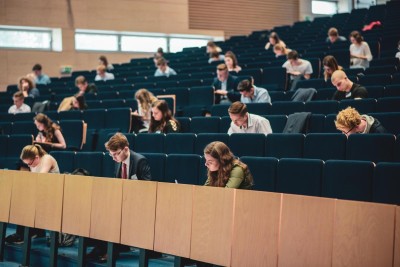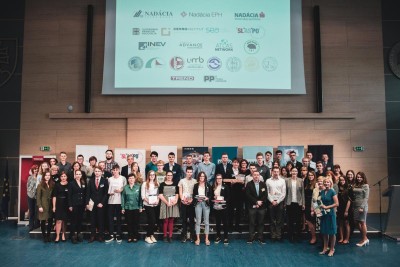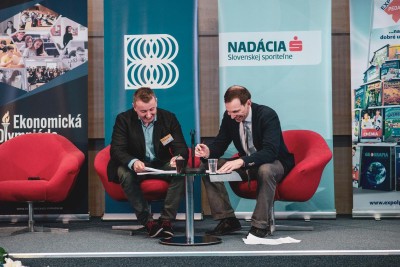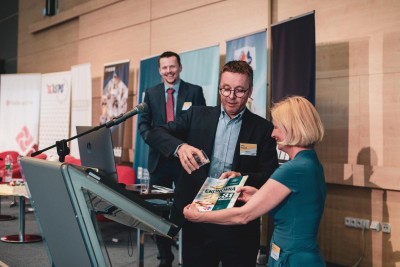The Economics Olympiad was launched in 2017 with a participation of 4,000 high school students. This year, the competition enjoyed even more popularity with more than 5,300 contestants overall.
On April 25, 2019, the national finals of 2018/2019 Economics Olympiad took place on the premises of University of Economics in Bratislava, where 50 young talented economists competed against each other.
The project´s aim is to improve economic and financial literacy of high school students.
It is organized by INESS (Institute of Economic and Social Studies) in cooperation with the Czech Institute of Economic Education (INEV).
Through its educational projects, INESS has been working with young people in Slovakia for a long time. INESS´s objective is to teach students to look critically at economic trends and matters both at home and abroad.
 The final round concluded the whole process of tests that participants had undergone. More than 5,300 students from 181 high schools took part in the school round (1st round) of the contest.
The final round concluded the whole process of tests that participants had undergone. More than 5,300 students from 181 high schools took part in the school round (1st round) of the contest.
They had to answer 25 questions, which were randomly generated on their computers, tackling various issues (from domestic economics, world economics, macroeconomics or international economics).
Subsequently, 438 successful participants advanced to the regional rounds. After evaluation of tests in the regional round, only 0.9 % of the students qualified as 50 finalists in the national finals.
“The school round was more about specific terms and general knowledge, although they were presented interestingly and illustrated on practical cases. The best part was the regional round and the finals, where you needed to think thoroughly about current economic problems which have significant influence on our day-to-day life. Excellent composition of tests, thank you!”, said one of the finalists of Economics Olympiad 2018/2019 in a questionnaire.
During the final round, the contestants were obliged to prove their knowledge both in written test and oral examination.
In the written test, they needed to present their general knowledge of economic theory and history, analytical skills and argumentative skills, not to omit their financial literacy. The questions focused on current economic topics such as capping of retirement age in Slovakia, the offer of accommodation services during the Ice Hockey World Championships, or the possible impact of the (now canceled) retailer tax on tax collection and food prices.
 Top 10 students with the best results from the written test then advanced to the oral round in which they needed to prove their knowledge in front of professional jury.
Top 10 students with the best results from the written test then advanced to the oral round in which they needed to prove their knowledge in front of professional jury.
The jury was comprised of experts from various fields such as the academia, private and non-governmental sectors, including: doc. Ing. Mgr. Zuzana Juhászová, PhD. (University of Economics in Bratislava), Ing. Daniela Danková (University of Matej Bel in Banska Bystrica), Ing. Štefan Máj (Slovenská sporiteľňa Foundation), Ing. Robert Chovanculiak, PhD. (INESS), and Mgr. Marcela Veselková, PhD. (Slovak Economic Association).
Nevertheless, the Grand Finals were not only about tests and evaluation. The contestants had the opportunity to take part in an Economic Quiz prepared by Martin Vlachynský and Robert Chovanculiak, which was a fun distraction. Additionally, the quiz was followed by the launch of a new textbook for secondary schools Economics in 31 lessons, published by INESS in cooperation with the publishing house Expol Pedagogika.
The first “godfather” of the textbook was Mr. Ivan Mikloš, former Minister of Finance of the Slovak Republic, currently advising to the Ukrainian Prime Minister and a president of MESA10.
“Textbooks are always a political matter in Slovakia. At the beginning of the new school year, the media will bring information concerning how many textbooks are missing at schools and specific ministers usually provide their point of view. This leads to a vivid two – three weeks long debate on the need of an open or closed market with textbooks, and around Halloween or around the election period no one remembers it. Well, nobody… you students and teachers, you need to think about it all the time when you are writing down notes which are dictated by the teacher himself”, said Mgr. Mira Schrimpelová Bianchi, Managing Director of Expol Pedagogika.
While the students were being examined, a discussion for teachers, the other participants, and the general public entitled “How Slovaks (Don’t) Invest?” was held. Among distinguished guests that expressed their opinions were Juraj Karpiš (INESS), Jozefína Žáková (SLASPO), Ján Šebo (EF UMB), and Radovan Sukup (SLOVCA).
 The audience was interested in advantages and disadvantages of life insurance and whether life insurance is not only beneficial for the companies that provide it. Also, an interesting debate sparked concerning pros and cons of renting flats for young people in comparison to flat ownership.
The audience was interested in advantages and disadvantages of life insurance and whether life insurance is not only beneficial for the companies that provide it. Also, an interesting debate sparked concerning pros and cons of renting flats for young people in comparison to flat ownership.
In the end, the best young economists were announced. Karin Krížovská from Gymnazium Ľudovíta Štúra, Trenčín came third, Eva Schwarzová from Obchodná Akadémia Kukučínova in Trnava was the second and the winner of the second year of the Economics Olympiad was Šimon Pekár from Biligválne gymnázium M. Hodžu in Sučany.
The contestants were congratulated by the organizers, project partners, and by the members of the Expert Council of the Economics Olympiad. In addition, the three most successful contestantsreceived valuable prizes, such as an e-book reader (3rd place), a mobile phone (2nd place), and a laptop (1st place).
 However, even the rest of the contestants did not leave empty-handed. The first ten contestants were awarded a book titled Factfullness by Hans Rosling, whereas an annual subscription for the TREND weekly was awarded to each of the 50 contestants.
However, even the rest of the contestants did not leave empty-handed. The first ten contestants were awarded a book titled Factfullness by Hans Rosling, whereas an annual subscription for the TREND weekly was awarded to each of the 50 contestants.
“I consider the organization of Economics Olympiad very positively – you can clearly see a humane approach, willingness, and enthusiasm of the organizers,” – another competitor mentioned in the evaluation questionnaire.
The second year of the Economics Olympiad highlighted the number of young economic talents we have in Slovakia. Also, we were again made aware of the need for more practical economic education in secondary schools. We believe that we will hear a lot about the names of the Economics Olympiad contestants and they will also carry the good name of Slovakia at home or abroad.
The organization of the Economics Olympiad would not have been possible without the kind support of our partners, to whom we warmly thank.
Partners in the 2018/2019 school year were the Slovak Banking Association, Slovenská sporiteľňa Foundation, Slovak Insurance Association, EPH Foundation, Tatra banka Foundation, Atlas Network, Advance Investments Foundation, INEV – Institute of Economic Education, Slovak Economic Society, CEVRO Institute in Prague and media partners TREND weekly and Poradca podnikateľa. Special thanks also goes to Slovak universities, which provided us with support for the organization of regional rounds and the national finals: Technical University of Košice, Prešov University in Prešov, Matej Bel University in Banská Bystrica, Slovak University of Agriculture in Žilina, University of Žilina, Alexander University of Trenčín Dubcek in Trencin, University of Sts. Cyril and Methodius in Trnava and University of Economics in Bratislava.
Translated by Diana Kralova
Photos: Milan David // TREND



